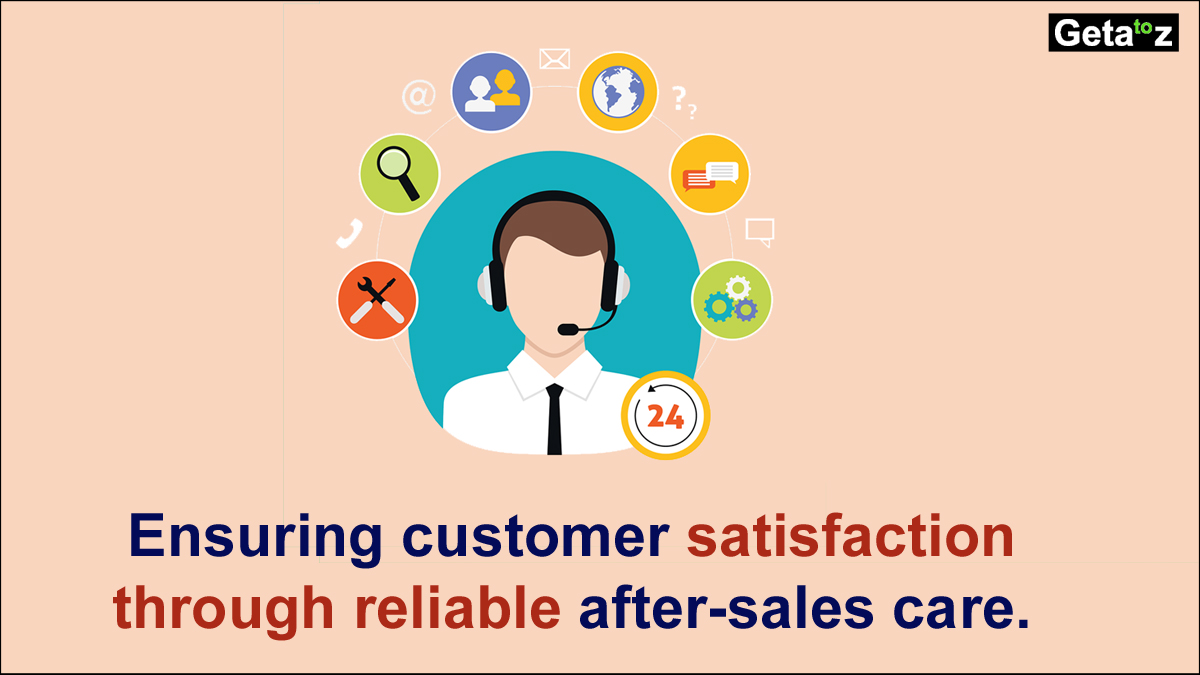After Sales Service
Updated: December 6, 2024

What is after-sales service?
After-sales service encompasses all processes aimed at supporting customers after a purchase. This includes offering proactive advice to help them maximize their purchase or simply ensuring their satisfaction with the product. Examples include generous warranties, 24/7 customer support, insurance coverage, free training, returns and exchanges, free upgrades, and integrating customer feedback.
Successful businesses prioritize customer satisfaction, recognizing customers as valuable assets. Providing high-quality products paired with excellent after-sales support demonstrates this commitment. Customers appreciate these efforts, rewarding businesses with repeat purchases and brand loyalty.
A positive first experience encourages customers to return and recommend your business to friends, family, and others. These referrals, combined with repeat purchases, contribute to increased revenue and long-term business growth.
Why is After-sales service is important for sellers?
- Boost Customer Satisfaction and Retention: Seamless customer service fosters enthusiastic brand loyalty, leading to higher satisfaction rates. Satisfied customers are more likely to return, reducing the need for costly marketing efforts to attract new clients, as retaining existing ones is more economical.
- Increase Repeat Sales: High customer satisfaction drives loyalty, resulting in lucrative repeat sales. Positive experiences not only encourage customers to spend more but also create upselling opportunities, enabling businesses to offer higher-value products.
- Gain Brand Advocates: Quality after-sales services build customer loyalty and generate effective word-of-mouth marketing. Satisfied customers often share their positive experiences with six or more people, increasing referrals and boosting your customer lifetime value.
- Enhance Brand Image: A strong after-sales experience strengthens your brand's reputation. Businesses that offer exceptional support are seen as helpful and trustworthy, encouraging customers to return and promoting a positive perception in the market.
- Avoid Costs of Poor Service: Poor customer service can damage your brand image. Dissatisfied customers are more likely to share negative experiences, harming your reputation and potentially leading to significant financial losses.
- Improve Employee Productivity: Great customer service impacts employees positively. Teams in organizations with strong support systems are often more engaged and productive, showcasing the tangible financial benefits of excellent service.
Tips to improve After-sales service:
Audit your service:
Identify improvement opportunities:
Create memorable experiences:
- Personalized messages: Always address your customers by name since people become friendlier and happier when they are addressed by name. Emails and messages that include personal touches, such as a name, can result in higher click and open rates.
- Customer loyalty rewards: Customers efforts get recognized and their love being seen in loyalty rewards as it tells customers that you see them and value their sponsorship or promotion. It is also more likely that loyal customers will buy more and become even more loyal when they feel loved and cared for.
- Make it up generously: You should provide generous remedial help when things does not work as planned. Sometimes, clients may not like what they received or an order could get messed up. You will need to correct any poor impressions they had about your business and give them a pleasant experience to share in such situations.
Prioritize customer satisfaction:
- Omnichannel Support: Offering support across multiple channels like phone, live chat, social media, email, and in-person interactions helps manage high ticket volumes efficiently. This approach ensures customers can reach out through their preferred platform, enhancing their experience.
- Proactive Customer Service: Respond promptly, warmly, and effectively to customer inquiries. Quick and considerate responses meet customer expectations, as most prefer not to wait long for assistance.
- Strong Guarantees: Providing solid guarantees, especially for high-value B2B transactions, builds customer confidence. Assurances that you’ll address any issues make clients more comfortable with their purchases.
- Seamless Returns: While returns may seem costly, offering free return shipping can influence a customer's decision to buy. A hassle-free returns process encourages repeat purchases and fosters trust in your brand.
- Flexible Refunds: A clear and customer-friendly refund policy enhances trust and confidence in your products. Ensure your policies are easy to understand, making clients feel secure in their purchases.
Incorporate feedback culture:
- Actively Seek Feedback: Encourage customers to share their experiences, as many may not volunteer positive feedback. Use post-purchase surveys or follow-up calls to understand their opinions and improve your offerings.
- Provide Warm and Prompt Responses: Always acknowledge customer feedback, even when it’s negative. A thoughtful and timely reply can help rebuild trust and maintain a positive brand image.
- Highlight Positive Reviews: Share great reviews widely to showcase customer satisfaction. Promote them across your channels and within your organization, inspiring employees by highlighting the impact of their efforts.
- Strive for Consistency: Treat positive reviews as motivation to continuously improve. Consistent excellence in customer service strengthens trust and reinforces your brand’s reputation.